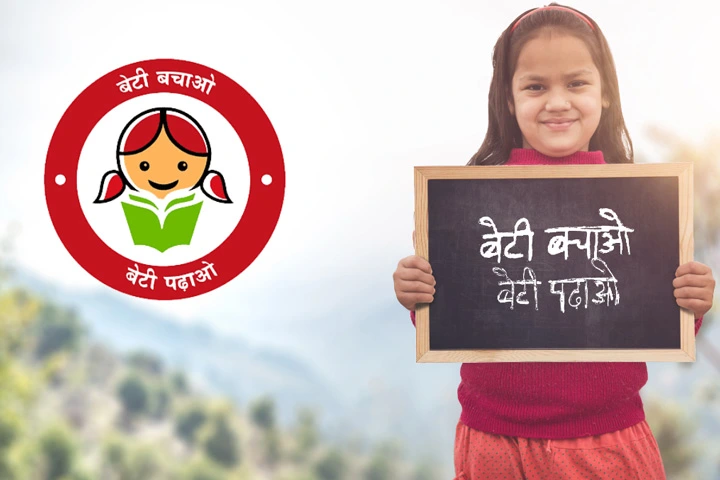

The scheme aims to educate citizens against gender bias and improve the efficacy of welfare services for girls.
Emancipation, safety and promotion of women have been central mantras of the UPA government under Prime Minister Narendra Modi’s leadership. The Beti Bachao Beti Padhao (BBBP) Scheme, launched by PM in 2015 at Panipat in Haryana with the objective of bringing behavioural change in the society towards birth and rights of a girl child, has resulted in increased awareness and sensitisation of the masses regarding prevalence of gender bias and role of community in eradicating it.
The name Beti Bachao, Beti Padhao translates to ‘Save the girl child, educate the girl child’. The scheme aims to educate citizens against gender bias and improve the efficacy of welfare services for girls. It was launched with initial funding of Rs 100 crore (US$ 13.5 million).
It is a tri-ministerial effort of Ministries of Women and Child Development, Health & Family Welfare and Human Resource Development.
For the first time in the country, the number of women is more than men, President Droupadi Murmu had said recently in her Parliament in her address highlighting the success of the Beti Bachao, Beti Padhao.
She said that the government has ensured that there is no restriction for women in any work, in any field of work.
“Girls have made their presence in the mining, army sector and recruitment of women has been allowed in all the sectors. Our girls are seeking education and training in Sainik Schools to military training schools now,” Murmu said.
Success of Beti Bachao Beti Padhao
As per government data available for six years (from 2014-20), the Sex Ratio at Birth (SRB) has improved by 16 points from 918 in 2014-15 to 934 in 2019-20. Gross Enrolment Ratio of girls in the schools at secondary level has improved from 77.45 to 81.32.
The Beti Bachao Beti Padhao scheme is one of the best solutions to focus on women’s status in society as a whole. Currently, women are not likely to complete their education and have only the most negligible probability of getting enrolled in schools than boys. Every year, millions of girls under 15 get pregnant. As girls are not educated, they choose to deliver in their early years of life, which leads to delivery-related challenges. With this scheme, millions of girls will have a chance to learn something and get educated.
The program ensures that all girls are deprived of education. Years back, girls have been the highest demographic to leave secondary school. There is a massive transformation in decision-making with easy access to education. Experts say that girls who get access to education are less likely to experience pregnancy underage.
Targets for Better Results:
Mobile and internet penetration rates have almost skyrocketed since the pandemic. While technology has become essential for most basic functions such as education, payments, and communication, leveraging technology for monitoring and evaluation purposes is imperative. While media campaigns under the BBBP have had exemplary results in raising the issue of son preference, proper monitoring such as regular sampling, and quarterly progress reports on implementations would be essential for forming better state-level and district-level policies aimed at improving the primary conditions that affect the health, survival, and education of girls.
Incentivising educated females to join schools as teachers could ramp up female enrollment in schools. It would help in bringing in gender parity in terms of staff as well as ease of communication and comfort for female pupils.
Implementation of a gender-sensitive scheme should also involve gender representation. Community-level workers who often work in a close nexus with the people and know the community quite well should be the face of this scheme. Local frontline workers such as ASHA workers, Anganwadi workers, and Mahila Mandals should be key players in the implementation of the scheme.
Refresher training and capacity building of the personnel employed on the field for community outreach is also important as they are more aware of the ground realities. Gender sensitisation training for personnel along with basic digital upskilling would go a long way in ensuring better implementation of the scheme.
According to a study by the National Council of Applied Economic Research, the unavailability of toilets on school premises has been observed as a major cause of high dropout amongst female students. Ensuring the availability of toilets on public properties such as schools would help boost the enrolment rate.
External Affairs Minister S Jaishankar on Thursday met a delegation of special envoys from the…
Amnesty International has issued a report demanding the immediate and unconditional release of detained leaders…
India on Thursday dispatched a consignment of 300,000 doses of Measles and Rubella vaccines, along…
At least four people were killed and dozens injured in violent clashes between law enforcement…
An earthquake of magnitude 7.3 on the Richter Scale rattled Alaska in the early hours…
Amid rising global tensions and economic uncertainty, External Affairs Minister S Jaishankar on Wednesday raised…